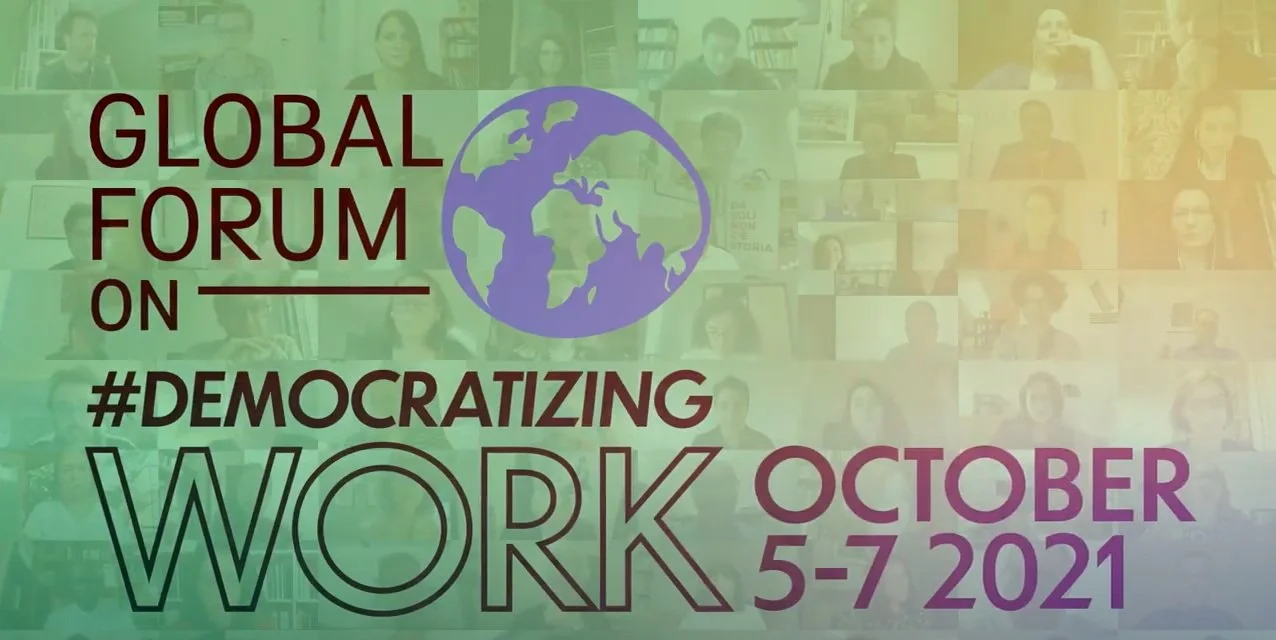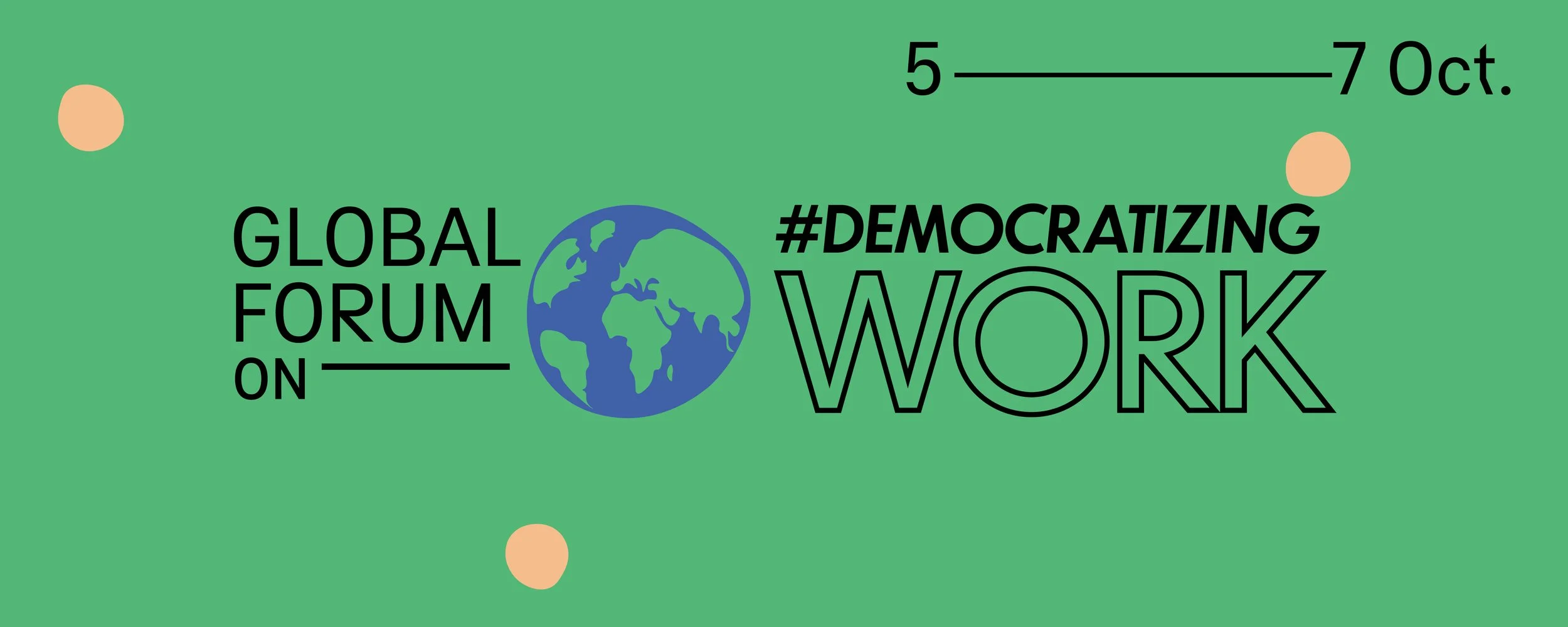GLOBAL FORUM
5–7 October 2021 // Online
Registration
As the Global Forum will be a completely immersive experience, registration is required to access the platform and is available via this link. You will fill up the form to attend the conference and then will be asked to create an account on the website platform. If you have any questions during the process please don’t hesitate to reach out.
To ensure the Global Forum is accessible to all, registration is and will remain free of charge for everyone. However, the event in itself is not. Funding is coming from various universities and academic institutions (Harvard, Groningen, Louvain, Yale, Bard College, etc.) and is not corporate-funded. If you feel like you can afford to contribute to the conference and wish to know more, email us at globalforum@democratizingwork.org to know more.
The deadline to submit a proposal has expired on 25 July 2021.
Do you have a question? Check our FAQs
We strongly encourage setting up national chapters to submit panel proposals tailored to the specific national contexts. If you wish to join one/create one, send us an email at globalforum@democratizingwork.org.
Agitation: From op-ed to manifesto
On 16 May 2020, the op-ed turned movement, WORK: DEMOCRATIZE, DECOMMODIFY, DECARBONIZE, was published in more than 43 newspapers, in 27 languages, in 36 countries around the world. It has since gathered thousands of signatories – including academics, activists, and people everywhere who believe that “working humans are so much more than resources.”
16 May 2021 marks the first anniversary of the op-ed’s initial publication. Over the course of the past year, the network behind the op-ed has taken shape. The op-ed and the three core principles were developed into a book, Le Manifeste Travail, which was published by Éditions du Seuil in October 2020. In March 2021, a Portuguese version, O Manifesto do Trabalho, was published open access by Lumen Juris. Several other versions of the book are in the process of being completed, including an English version that will be published by the University of Chicago Press in 2022.
The Democratizing Work manifesto has received significant positive media attention from outlets around the world, and the group of female scholars at its heart have participated in many events, written related articles, and been involved in interviews and podcast recordings, many of which are available here.
A year after the release of the op-ed, the three core principles have only become more relevant, and the stakes for workers, and indeed the planet, may be higher than ever.
Innovation: From manifesto to the first Global Forum on Democratizing Work
The first-ever Global Forum on Democratizing Work, on 5–7 October 2021, will allow us to build the future of the #DemocratizingWork movement together, across geographical and disciplinary boundaries.
The Global Forum will gather participants from universities, trade unions, progressive businesses, public institutions, environmental and human rights NGOs, the media. Beyond these communities, activists or concerned citizens who are interested in the message encapsulated in the manifesto is welcome. With such a transdisciplinary exchange of perspectives, we hope to fuel a productive and inclusive learning process about the Manifesto’s principles. Participants will have the opportunity not only to attend sessions with prominent figures whose work focuses on the three core principles (DEMOCRATIZE, DECOMMODIFY, DECARBONIZE), but also to discuss ideas and initiatives in smaller groups, based on common but diverse interests, paving the way towards orchestration.
Orchestration: From ad hoc efforts to an organized #DemocratizingWork movement
To continue the #DemocratizingWork movement, actions must be orchestrated at different levels (continental, national, regional, local) in order to make a significant impact. For this reason, participants from the same country and/or region will have the opportunity to exchange with participants belonging to a diverse set of backgrounds, but united in the commitment to materialise these principles, with the goal of establishing a framework for national and regional action in the aftermath of the Global Forum.
The Global Forum on Democratizing Work has been developed with a strong participatory dimension in mind: we want you to be involved! You have the opportunity to form your own panels and sessions, involve speakers, and tailor discussions to your own country or region. (The deadline to submit a proposal has expired on 25 July 2021.)
The Global Forum will take place from Tuesday October 5th until Thursday October 7th. Each day will center on one of the three principles of the manifesto – DEMOCRATIZE, DECOMMODIFY, DECARBONIZE – and sessions will be scheduled according to this structure.
These dates have not been chosen randomly: October 7th, 2021 marks the 10th anniversary of the World Day for Decent Work (WDDW) organized by the International Trade Union Confederation.
Given the context of the COVID-19 pandemic and our aspiration to reach across our planet, the organizing team has decided to set up the Global Forum fully online. This will allow everyone to participate regardless of restrictions and sanitary measures.
We hope that knowing that our movement is gathering steam gives you the strength to continue the crucial work together. We are counting on you to join us!
Experience the Global Forum on Democratizing Work
During the Global Forum, you will have the opportunity to:
Attend plenaries presented by exciting speakers;
Experience an immersive and interactive experience;
Engage in roundtables and panel discussions, according to specific interests;
Set up a discussion about one of your most recent or relevant work or practical experiences around the 3 principles;
Create national and regional dynamics to move the movement forward after the Global Forum;
Last but not least: participate in the first-ever Global Forum on Democratizing Work!
Registration is free. Funding is coming from various universities and academic institutions (Harvard, Groningen, Louvain, Yale, Bard College, etc.).
Plenary Sessions
Plenary sessions will take place each day at 11am-1.30pm NYC / 5pm-7.30pm Paris / 7:30pm-10pm Delhi / 1.00 -2.30am Sydney.
Tuesday, October 5th: DEMOCRATIZE
Anthony Kwame Appiah (Professor, philosopher, New York University, USA-Ghana)
Arzu Çerkezoğlu (President, Confederation of Progressive Trade Unions of Turkey (DISK)), Turkey
Iñigo Albizuri Landazabal (Global Head of Public Affairs, Mondragon Cooperative Corporation), Spain
Elizabeth Anderson (Professor of Philosophy, University of Michigan), USA
Wednesday, October 6th: DECOMMODIFY
Jayati Ghosh (Economist, University of Massachusetts-Amherst, U.N. high-level advisory board on economic, social affairs), India-USA
Aurore Lalucq, (Member of the European Parliament), France
Jean Drèze (Professor of Economics, Ranchi University; Delhi School of Economics), India
Ndongo Sylla (Economist, Rosa Luxemburg Foundation), Senegal-Germany, former technical advisor at the Presidency of the Republic of Senegal
Thursday, October 7th: DECARBONIZE
Tatiana Ribeiro, (Adjunct Professor at the Federal University of Ouro Preto, University of Ouro Preto, Brazil, Member of the Latin American Democratic Constitutionalism Network, Coordinator of the Socioenvironmental Studies and Research Group (GEPSA)) Brazil
Kate Aronoff (Journalist, The New Republic), USA
Kristina Touzenis (Managing Partner BST Impact and Head of the Geneva Chapter of Women in Sustainable Finance), Switzerland
A. Erinç Yeldan (Professor of Economics and Dean at Kadir Has University; Member-elect of the Science Academy), Turkey




Social Media Material
We have prepared social media graphics for you to share on your profile to spread the word about the event. For both visuals, click the link and it will open the graphic on a new page, then right-click the image and select “Save Image As” to save it to your computer. Then it is easy to share the graphic on social media.
Download the Global Forum on #DemocratizingWork social media card here in English, Français & Español.
Download a Twitter header here